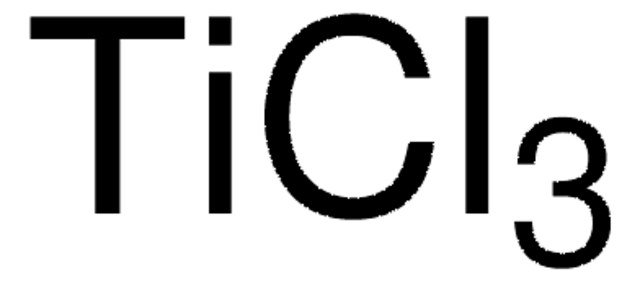514381
Titanium(III) chloride
≥99.995% trace metals basis
Synonym(s):
Titanium trichloride
Sign Into View Organizational & Contract Pricing
All Photos(1)
About This Item
Linear Formula:
TiCl3
CAS Number:
Molecular Weight:
154.23
EC Number:
MDL number:
UNSPSC Code:
26111700
PubChem Substance ID:
Recommended Products
Assay
≥99.995% trace metals basis
form
crystalline
reaction suitability
reagent type: catalyst
core: titanium
mp
440 °C (dec.) (lit.)
SMILES string
Cl[Ti](Cl)Cl
InChI
1S/3ClH.Ti/h3*1H;/q;;;+3/p-3
InChI key
YONPGGFAJWQGJC-UHFFFAOYSA-K
Looking for similar products? Visit Product Comparison Guide
Application
Used for the vapor-phase formation of intermetallic compounds with ultrafine particle size.
Signal Word
Danger
Hazard Statements
Precautionary Statements
Hazard Classifications
Pyr. Sol. 1 - Skin Corr. 1B
Supplementary Hazards
Storage Class Code
4.2 - Pyrophoric and self-heating hazardous materials
WGK
WGK 3
Flash Point(F)
Not applicable
Flash Point(C)
Not applicable
Personal Protective Equipment
dust mask type N95 (US), Eyeshields, Gloves
Choose from one of the most recent versions:
Already Own This Product?
Find documentation for the products that you have recently purchased in the Document Library.
Gnana S Siluvai et al.
Biochemistry, 48(51), 12133-12144 (2009-11-20)
Sco-like proteins contain copper bound by two cysteines and a histidine residue. Although their function is still incompletely understood, there is a clear involvement with the assembly of cytochrome oxidases that contain the Cu(A) center in subunit 2, possibly mediating
Jun-ichi Matsuo et al.
Organic letters, 12(14), 3266-3268 (2010-06-24)
N-p-Toluenesulfonyl (Ts) aldimines reacted with 3-ethoxycyclobutanones by catalysis of titanium(IV) chloride to afford 2,3-di- or 2,3,3-trisubstituted N-Ts-2,3-dihydro-4-pyridones. Synthesis of (+/-)-bremazocine was efficiently accomplished by using this method.
Palaniappan Kulanthaivel et al.
Drug metabolism and disposition: the biological fate of chemicals, 32(9), 966-972 (2004-08-21)
Phase I oxidative metabolism of nitrogen-containing drug molecules to their corresponding N-oxides is a common occurrence. There are instances where liquid chromatography/tandem mass spectometry techniques are inadequate to distinguish this pathway from other oxidation processes, including C-hydroxylations and other heteroatom
L Messori et al.
FEBS letters, 442(2-3), 157-161 (1999-02-03)
The reaction of human serum apotransferrin with titanium(IV) citrate under physiological conditions results in the formation of a specific bis-titanium(IV) transferrin adduct (Ti2Tf hereafter) with two titanium(IV) ions loaded at the iron binding sites. The same specific Ti2Tf complex is
H A Akers et al.
Analytical biochemistry, 154(2), 559-563 (1986-05-01)
Thirteen model alpha-ketocarboxylic acids and alpha-dicarbonyl compounds have been observed to be reduced by titanium(III) chloride. The products of these reactions were shown by melting (boiling) points, mixed melting points, derivatives, refractive indices, infrared, and NMR comparisons with authentic compounds
Our team of scientists has experience in all areas of research including Life Science, Material Science, Chemical Synthesis, Chromatography, Analytical and many others.
Contact Technical Service







